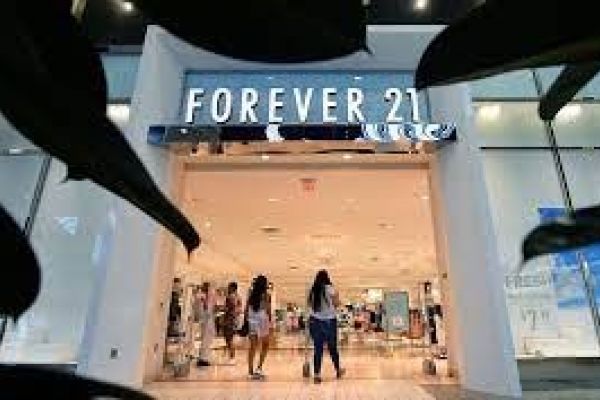Forever 21, the renowned multinational fast fashion retailer, has a fascinating company history. Founded in 1984 by Do Won Chang and Jin Sook Chang, Forever 21 has become a global fashion brand with approximately 540 outlets worldwide. Offering clothing, accessories, beauty products, and home goods for women, men, and children, Forever 21 has cemented its position as a go-to destination for trendy and affordable fashion.
Over the years, Forever 21 has faced its fair share of controversies, including labor practice issues and copyright infringement accusations. Despite these challenges, the brand continues to resonate with its target audience and remains a prominent player in the industry.
Key Takeaways:
Page Contents
- 1 The Founding of Forever 21
- 2 Forever 21’s Expansion and Acquisitions
- 3 Challenges and Controversies
- 4 Bankruptcy and Change in Ownership
- 5 Recent Developments and Partnerships
- 6 Forever 21’s Brand Identity and Value Proposition
- 7 Forever 21’s Distribution Channels
- 8 Key Partnerships and Resources
- 9 The Future of Forever 21
- Forever 21 was founded in 1984 by Do Won Chang and Jin Sook Chang.
- The company is currently operated by Authentic Brands Group and Simon Property Group.
- Forever 21 offers a wide range of fashionable clothing and accessories for women, men, and children.
- The brand has faced controversies involving labor practices and copyright infringement.
- Despite challenges, Forever 21 has maintained its appeal and continues to expand its global presence.
The Founding of Forever 21
Forever 21, originally known as Fashion 21, has an intriguing origin story that begins in Los Angeles on April 16, 1984. It was founded by Do Won Chang and Jin Sook Chang, immigrants from South Korea who had a vision for bringing trendy fashion to the masses at affordable prices. The first store, located in Los Angeles, catered to the local Korean American community by offering designs similar to those popular in South Korea.
Recognizing the potential for success, Do Won and Jin Sook Chang quickly realized that their business model had to evolve to keep up with the ever-changing fashion industry. They embraced the concept of fast fashion, which focuses on quick turnaround times to offer customers the latest trends. This shift proved to be a game-changer, as Forever 21 became synonymous with affordable and stylish clothing.
The success of Forever 21’s business model propelled the company into rapid expansion. On average, a new store was opened every six months, allowing the brand to establish a strong presence in the fashion retail industry. Forever 21’s dedication to providing trendy designs at low prices struck a chord with consumers, helping the brand flourish and make its mark.
The founding of Forever 21, then known as Fashion 21, laid the foundation for what would later become a global fashion empire. Today, the brand continues to uphold its founding principles, offering affordable and fashionable clothing to customers worldwide.
| Forever 21 Founders | Forever 21 Founding Date | Original Name |
|---|---|---|
| Do Won Chang and Jin Sook Chang | April 16, 1984 | Fashion 21 |
Forever 21’s Expansion and Acquisitions
Over the years, Forever 21 has experienced significant growth and expansion, solidifying its position as a global fashion retailer. Through strategic acquisitions and innovative store concepts, the company has continuously expanded its reach in the competitive fashion industry.
In 2005, Forever 21 made a notable acquisition by purchasing the chain Gadzooks for $33 million. This acquisition resulted in a doubling of its store count, bringing the total number of stores to 400. The acquisition of Gadzooks allowed Forever 21 to strengthen its presence in the market and cater to a wider customer base.
Forever 21 also introduced the concept of Forever XXI, flagship stores with larger square footage. These flagship stores served as showcases for the brand, offering an enhanced shopping experience and a wider range of product offerings. The launch of Forever XXI solidified Forever 21’s position as a leader in the fast fashion industry.
Key Acquisitions and Expansion Milestones
Here are some key acquisitions and expansion milestones that have contributed to Forever 21’s global growth:
- Acquisition of Gadzooks in 2005, doubling the store count to 400
- Introduction of Forever XXI flagship stores with larger square footage
- By 2013, Forever 21 had over 480 stores worldwide and revenue of $3.7 billion
Despite the success and expansion, Forever 21 also faced challenges along the way. The company struggled with unprofitable international locations and increased competition in the fast fashion market. However, Forever 21’s commitment to staying ahead of the trends and offering affordable fashion choices has allowed them to navigate these challenges and remain a prominent player in the industry.
Forever 21’s expansion and acquisitions have played a significant role in its journey towards becoming a global fashion powerhouse. By strategically expanding its store network and acquiring well-established chains, Forever 21 has established a strong presence in the international market, catering to fashion-conscious consumers worldwide.
Challenges and Controversies
Throughout its history, Forever 21 has faced several challenges and controversies that have impacted its reputation and brand image. These controversies have highlighted issues related to labor practices, copyright infringement, and other ethical concerns.
Labor Practices
One of the controversies involving Forever 21 revolves around its labor practices. The company has faced criticism for alleged poor working conditions, including low wages, long working hours, and inadequate employee benefits. These allegations have raised concerns about the treatment of workers within the fast fashion industry, shining a spotlight on the need for fair and ethical practices.
Copyright Infringement
Forever 21 has also been embroiled in copyright infringement disputes with various artists and designers. The company has been accused of copying and reproducing designs without proper authorization or compensation. These accusations have led to legal battles and settlements, further highlighting the importance of respecting intellectual property rights in the fashion industry.
Controversies and Criticisms
In addition to labor practices and copyright infringement, Forever 21 has faced other controversies and criticisms. In 2011, the company came under scrutiny when it was discovered that some of its jewelry contained high levels of cadmium, a toxic metal. Settlement payments were made, and limits on cadmium in jewelry were implemented as a result.
Forever 21 has also faced backlash for selling shirts with anti-education and sexist messages, which drew criticism from consumers and advocacy groups. These controversies have sparked discussions about responsible and ethical business practices, as well as the influence of fast fashion on society.
Despite these challenges, Forever 21 has made efforts to address and rectify these controversies, improving its labor practices and taking steps to enhance its intellectual property policies. The company continues to navigate these issues while striving to rebuild trust and maintain its position in the fast fashion industry.
| Controversy | Description |
|---|---|
| Labor Practices | Allegations of poor working conditions, low wages, and inadequate benefits. |
| Copyright Infringement | Accusations of copying and reproducing designs without authorization or compensation. |
| Jewelry Controversy | Discovery of jewelry containing high levels of toxic metal (cadmium). |
| Anti-Education and Sexist Shirts | Criticism for selling shirts with controversial messages. |
Bankruptcy and Change in Ownership
In 2019, Forever 21 faced significant challenges that led to the company filing for Chapter 11 bankruptcy protection. The fast fashion retailer struggled with increased competition, reputational damage, and a costly expansion strategy that proved unsustainable. As a result, Forever 21 made several strategic decisions to navigate through this difficult period and ensure its survival in the retail industry.
Foremost, the company announced the closure of stores in 40 countries as part of its bankruptcy proceedings. This move allowed Forever 21 to focus on its core operations in the United States and Latin America, where it sought to strengthen its position in the market.
During the bankruptcy process, Forever 21 caught the attention of Authentic Brands Group (ABG), a global brand development company. ABG, along with Simon Property Group and Brookfield Property Group, acquired Forever 21, recognizing the potential of the brand and its loyal customer base. This ownership change injected new life into the company and provided a fresh opportunity for growth.
Under the new ownership, Forever 21 embarked on a revitalization strategy, aiming to revive its brand image and adapt to changing consumer preferences. The acquisition by ABG, known for its successful portfolio of fashion and lifestyle brands, brought expertise and resources that could propel Forever 21’s resurgence in the retail industry.
With ABG’s guidance, Forever 21 began focusing on building a more sustainable business model, streamlining operations, and improving its online presence. The company sought to leverage its e-commerce platform to better serve its customers through an enhanced online shopping experience and targeted marketing campaigns.
Furthermore, Forever 21 explored strategic partnerships and collaborations to diversify its offerings and expand its customer reach. By collaborating with popular fashion designers, influencers, and celebrities, Forever 21 aimed to create exclusive collections that would resonate with its target market and generate excitement around the brand.
The bankruptcy and subsequent change in ownership marked a critical turning point for Forever 21. By addressing its financial challenges and partnering with industry leaders, the company aimed to secure a solid foundation for its future success. The focus on innovation, adaptability, and delivering value to customers positioned Forever 21 to navigate the evolving retail landscape and regain its position as a prominent player in the fashion industry.
Recent Developments and Partnerships
Since the ownership change, Forever 21 has been actively working to revitalize its brand and fortify its position in the fashion industry. One of the company’s strategies involves forging partnerships with renowned fashion designers, influential social media personalities, and popular celebrities. Through these collaborations, Forever 21 has been able to create exclusive branded collections that cater to the ever-changing tastes and preferences of its customers. These partnerships not only add a fresh and exciting element to the brand but also generate significant buzz and anticipation among fashion enthusiasts.
In addition to collaborations, Forever 21 has been actively expanding its reach in international markets. Through licensing deals, the company has re-entered markets like the United Kingdom and the European Union, aiming to regain its foothold and cater to a larger global customer base. By expanding its presence in these key regions, Forever 21 can tap into new market segments and attract a diverse range of fashion-conscious consumers.
Furthermore, Forever 21 continues to focus on strengthening its e-commerce capabilities. Recognizing the growing importance of online retail, the brand has invested heavily in its digital platforms to provide a seamless and convenient shopping experience to its customers. By leveraging technology and optimizing its online presence, Forever 21 aims to enhance customer engagement and maximize its global reach.
In its pursuit of innovation and growth, Forever 21 is also exploring new product lines to diversify its offerings. By introducing fresh styles and expanding into new categories, the brand stays at the forefront of fashion trends and ensures that its customers have a wide range of options to choose from.
Forever 21’s recent developments and partnerships signify the brand’s commitment to adapt to the changing landscape of the fashion industry. With a renewed focus on collaborations, international expansion, e-commerce, and product diversification, Forever 21 aims to regain its position as a key player in the fast-fashion market and deliver stylish and affordable fashion to customers worldwide.
Forever 21’s Brand Identity and Value Proposition
Forever 21 has established a strong brand identity centered around its fast fashion approach. With a deep understanding of the fashion needs of young adults and teenagers, the company offers trendy and affordable clothing options that allow individuals to express their personal style without breaking the bank.
Forever 21’s value proposition lies in its ability to provide a wide range of fashion choices at budget-friendly prices. The brand caters to fashion-conscious consumers who are constantly seeking the latest trends and styles. By staying ahead of the curve and delivering on-trend apparel, Forever 21 has positioned itself as a go-to destination for fashion enthusiasts.
The target market for Forever 21 primarily consists of young adults and teenagers who are passionate about fashion and looking for affordable options that align with their style preferences. The brand’s ability to offer quality and fashionable clothing at accessible prices has resonated with this demographic, allowing Forever 21 to build a loyal customer base.
Forever 21’s Value Proposition:
- Wide range of fashion choices
- Affordable pricing
- Trendy and up-to-date styles
- Quality products
- Accessible to young adults and teenagers
| Brand Identity | Value Proposition | Target Market |
|---|---|---|
| Fast fashion approach | Wide range of fashion choices at affordable prices | Fashion-conscious young adults and teenagers |
Forever 21’s Distribution Channels
Forever 21 utilizes multiple distribution channels to reach its customers and deliver its products. By employing a multi-channel approach, the company ensures accessibility and convenience for consumers, catering to their diverse shopping preferences.
Physical Stores
Forever 21 operates a vast network of physical retail stores across various locations worldwide. These brick-and-mortar establishments allow customers to experience the brand firsthand, providing them with the opportunity to browse through a wide range of clothing, accessories, and home goods. Forever 21’s physical stores create an immersive shopping environment, where shoppers can try on apparel and engage with knowledgeable sales associates for personalized assistance.
E-commerce
In addition to its physical stores, Forever 21 has a robust e-commerce platform which includes a user-friendly website and a mobile app. Through its online channels, customers can conveniently browse and purchase products from the comfort of their own homes or while on the go. Forever 21’s e-commerce platform showcases its extensive product range, offers secure payment options, and provides efficient order fulfillment and delivery services, ensuring a seamless shopping experience for online shoppers.
Social Media and Influencer Marketing
Forever 21 recognizes the power of social media and leverages popular platforms such as Instagram, Facebook, and Twitter to amplify its brand visibility and engage with its target audience. The company actively collaborates with influencers and celebrities to promote its products, generating buzz and social proof among their millions of followers. By partnering with influential individuals, Forever 21 taps into their established fan base and expands its reach, effectively driving brand awareness and customer engagement.
Key Partnerships and Resources
Forever 21 understands the power of collaboration and has established key partnerships with fashion designers, influencers, and celebrities. Through these collaborations, the brand creates exclusive collections and branded partnerships that capture the attention of its target audience and generate excitement. By joining forces with renowned names in the fashion industry, Forever 21 expands its reach and reinforces its position as a leading fast-fashion retailer.
These collaborations allow Forever 21 to tap into the unique design aesthetics and creative insights of its partners, resulting in fresh and trendy collections that resonate with consumers. By leveraging the creativity and influence of fashion designers, influencers, and celebrities, Forever 21 creates a sense of exclusivity and creates a strong connection with its target market.
In addition to its key partnerships, Forever 21 possesses a range of valuable resources that contribute to its success. The company’s design teams work tirelessly to develop fashion-forward and affordable pieces that align with current trends. Forever 21’s efficient supply chain and manufacturing processes enable it to bring new styles to market quickly, ensuring a constant rotation of trendy products.
Forever 21’s brand reputation plays a crucial role in attracting customers and maintaining their loyalty. The company has built a strong brand identity as a provider of affordable fashion, making it a go-to destination for fashion-conscious individuals seeking value for money.
The brand’s marketing strategies, encompassing both traditional and digital channels, help raise awareness and promote its offerings to a global audience. Whether through engaging social media campaigns or strategic influencer partnerships, Forever 21 effectively connects with its target market and drives traffic to its retail stores and online platforms.
Lastly, Forever 21’s global network of retail stores and its robust e-commerce platform serve as essential resources. With a presence in various countries, the brand ensures convenient access to its products for customers around the world. The e-commerce platform offers a seamless shopping experience and expands the brand’s reach beyond physical store locations.
Key Partnerships and Resources
| Key Partnerships | Key Resources |
|---|---|
|
|
These key partnerships and resources enable Forever 21 to stay relevant in the fast-paced fashion industry and cater to the evolving needs of its customers. By leveraging its collaborative efforts and utilizing its valuable resources, Forever 21 maintains its position as a leading player in the global fashion market.
The Future of Forever 21
After emerging from bankruptcy, Forever 21 is strategically charting its course toward a promising future. The company’s growth strategy revolves around revitalizing the brand and expanding its reach into new markets.
One key aspect of Forever 21’s future plans is forming strategic partnerships. By collaborating with fashion designers, influencers, and celebrities, the brand aims to bring unique and exclusive collections to its customers. These partnerships not only generate excitement but also help drive brand recognition and customer loyalty.
Furthermore, Forever 21 is exploring new product lines to cater to evolving consumer preferences. By introducing fresh styles and expanding its product offerings, the company seeks to stay ahead of fashion trends and remain relevant to its target market.
Additionally, Forever 21 plans to strengthen its online presence and leverage its e-commerce platform. Recognizing the growing significance of digital channels, the company aims to enhance the online shopping experience and create a seamless omnichannel experience for its customers. Concurrently, Forever 21 is focused on bolstering its foothold in key markets by opening new physical stores and refining its retail strategies.
With a commitment to adaptability and innovation, Forever 21 is determined to regain its prominent position in the fast-fashion industry. By embracing change and implementing a comprehensive growth strategy, the brand is poised to write a new chapter in its post-bankruptcy journey – a chapter characterized by resilience, expansion, and continued fashion-forward offerings.
Also Read: Is Deadliest Catch’s Josh Harris Wed? Family And Wealth





